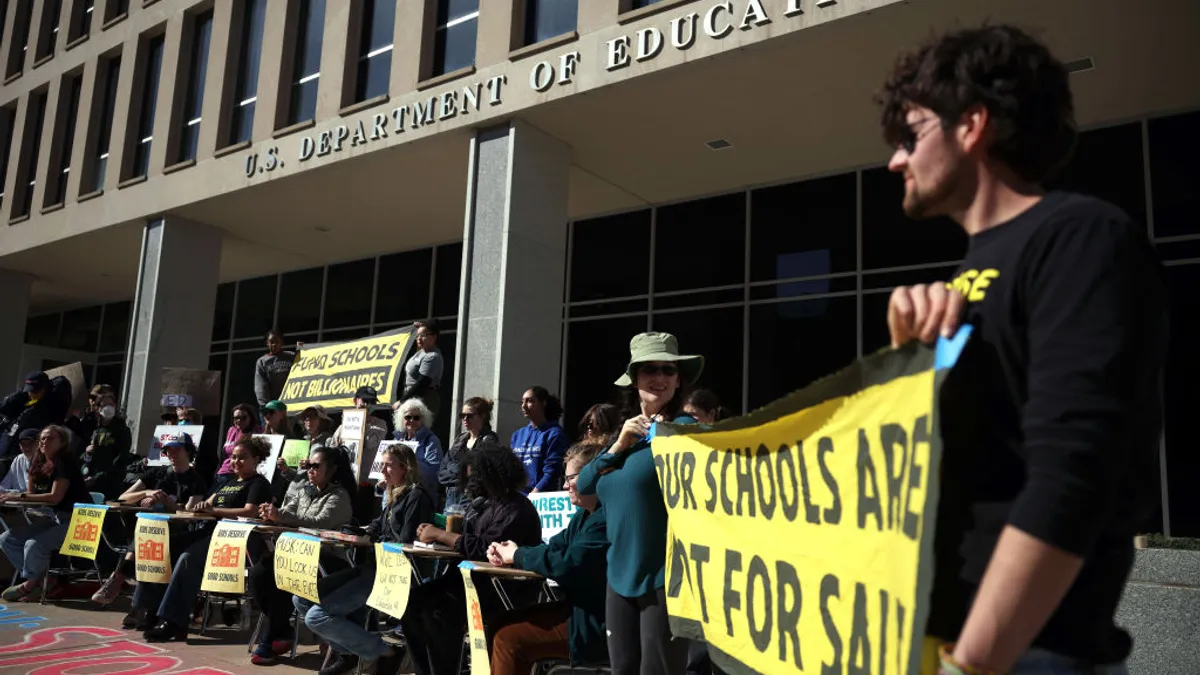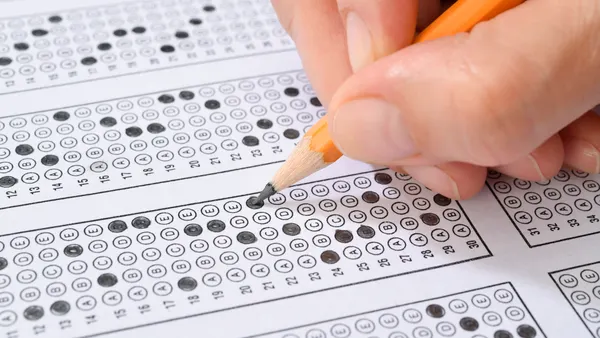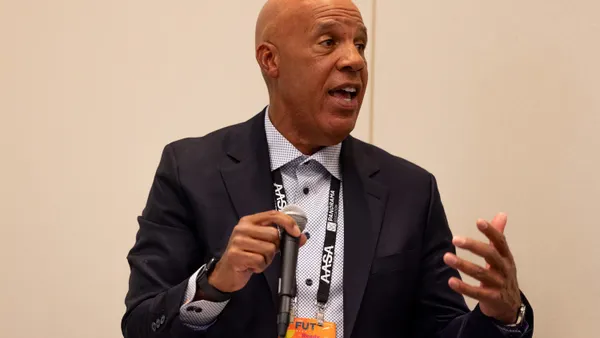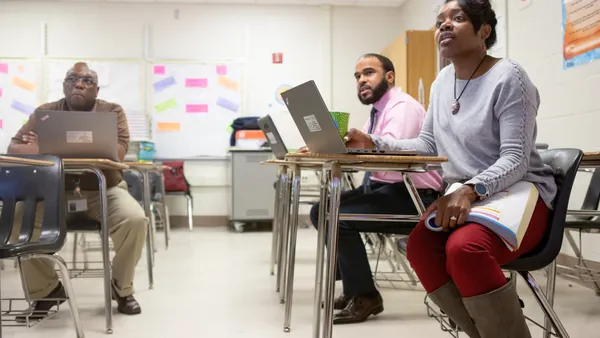Dive Brief:
- More than 850 local, state and national organizations Thursday morning released a joint commitment to support federal special education law and to protest any move that separates services for students with disabilities from the U.S. Department of Education.
- Coalition members, who also include individual advocates, support keeping the Education Department as an independent agency that is fully staffed and funded to oversee federal laws including the Individuals with Disabilities Education Act and Section 504.
- The statement comes just days after the Education Department announced it was transferring the management of six core programs to other federal agencies. Special education programming was not part of that announcement, but the Trump administration said it was still exploring that option.
Dive Insight:
The coalition is led by the Council of Parent Attorneys and Advocates, a nonprofit that works to protect the civil rights of children with disabilities, and the Council of Administrators of Special Education, a professional membership organization. The signers — who include educators, disability rights advocates, parents, attorneys, local disability organizations and others — are uniting against what they call threats to fragment federal services for students with disabilities.
To fulfill the promise of IDEA and Section 504, "families and educators must be empowered as true partners in supporting students with disabilities," said Phyllis Wolfram, executive director of CASE, in a Thursday statement.
COPAA CEO Denise Marshall said in the same statement, “With the current policy, funding, dismantling of the Department of Education, and other threats to the IDEA, our organizations have forged an essential partnership."
IDEA, which turns 50 on Nov. 29, guarantees that students with disabilities receive individualized academic, physical and behavioral supports based on their needs and strengths. Neither Congress nor the Education Department has called for making substantial changes to the law, which was last reauthorized in 2004.
About 8.4 million infants, toddlers, children and young adults with disabilities qualified for IDEA services in 2023, the last year for which federal data is available.
On Tuesday, the Education Department announced it would create interagency agreements to move management of K-12 funding for low-income schools, homeless youth, academic supports and other Office of Elementary and Secondary Education programs to the U.S. Department of Labor. Another shift would move the management of international education and foreign language studies programs to the U.S. Department of State.
The Education Department already transfered management of career and technical education programs to the Labor Department earlier this year. At a House Education and Workforce subcommittee hearing on Wednesday, two Democratic lawmakers said several state CTE programs faced funding delays due to a new grant management process at the Labor Department.
Under the interagency agreements, the Education Department will retain responsibility for the programs, while grant management, technical assistance and other activities move to the partner federal agency.
The Trump administration outlined benefits for this arrangement, including opportunities for innovation and reduced federal bureaucracy by giving states more autonomy over how to spend federal funds.
U.S. Education Secretary Linda McMahon, in a post on X Tuesday, said, "Without the federal Department of Education, local districts will receive MORE dollars for learning and student support."
The Trump administration has made it abundantly clear that it ultimately wants to close the Education Department. However, such a move requires congressional approval.
Special education advocates, parents and professionals have all along been resisting the dismantling of the agency, particularly for special education programming and oversight.
In the past, President Donald Trump and McMahon have voiced support for moving special education management to the U.S. Department of Health and Human Services. Many special education advocates oppose that idea, saying it would dilute the importance of considering students with disabilities as learners.
In July, former federal special education leaders from both Republican and Democratic administrations over the past five decades wrote to leaders in Congress, urging them to keep special education programming and accountability within the Education Department.
Likewise, the more than 850 groups in Thursday’s joint commitment said the Education Department "should remain an independent agency that is fully staffed and funded to oversee federal laws including IDEA and Section 504." The coalition also emphasized that states should retain substantial responsibility for special education with the federal government playing a "crucial role" through funding, policy and ensuring equitable educational opportunities.
The group's seven principles further outline criteria for advocates and educators to work together to promote and protect IDEA "in an ever-pressing policy and funding climate that has left IDEA vulnerable and overwhelmingly underfunded as identification rates continue to rise."
The seven principles are:
- Public education is the cornerstone of a healthy democracy
- Free, quality public education must be available to every child and youth regardless of a family's situation.
- All participants (parents and school personnel) should be full and meaningful partners in the education of children and youth with disabilities.
- The federal government plays a crucial role in supplementing state funding and in shaping special education policy that ensures equitable access to quality education for students with disabilities. Under federal law, states retain substantial responsibility for the education of children and youth with disabilities.
- The rights of children and youth with disabilities to a Free Appropriate Public Education (FAPE) in the Least Restrictive Environment (LRE) is essential to their accessing a meaningful and equitable education and must be maintained and protected through the Individuals with Disabilities Education Act (IDEA) and Section 504 of the Rehabilitation Act of 1973.
- Federal funding under IDEA should be provided at the 40% per pupil expenditure level originally promised by the U.S. Congress to assure states have the capacity to provide needed services and specially designed instruction to students with disabilities.
- The U.S. Department of Education should remain an independent agency that is fully staffed and funded to oversee federal laws including IDEA and Section 504.













